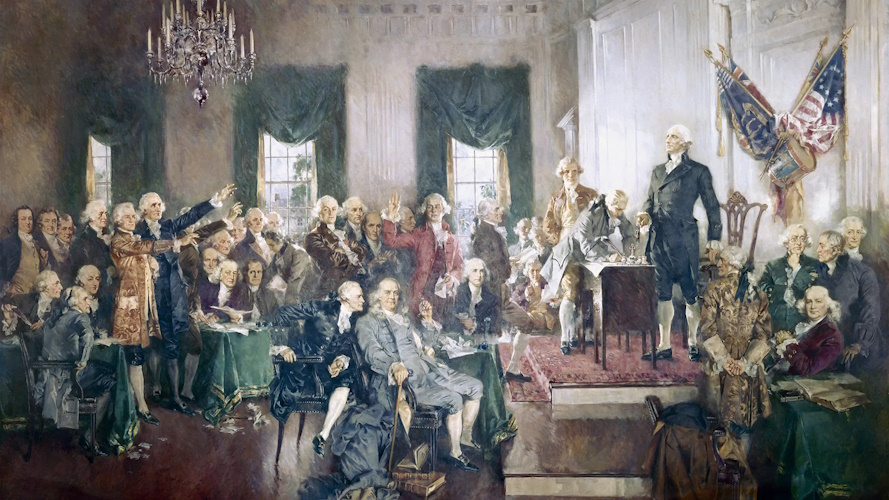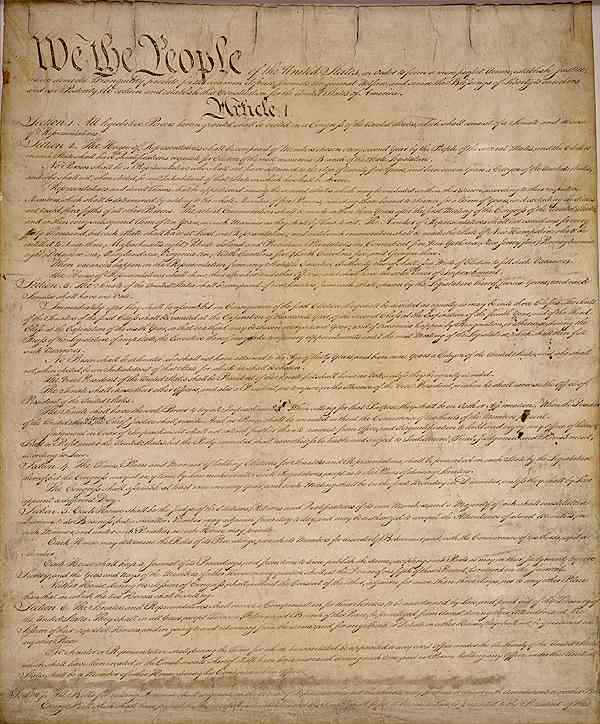
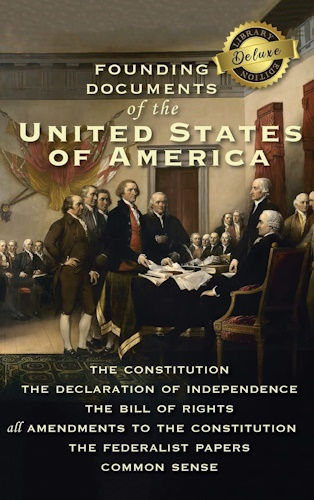
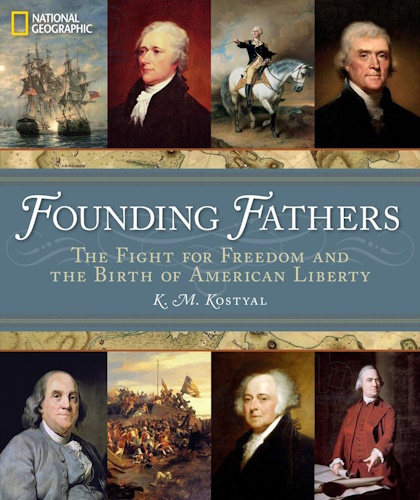
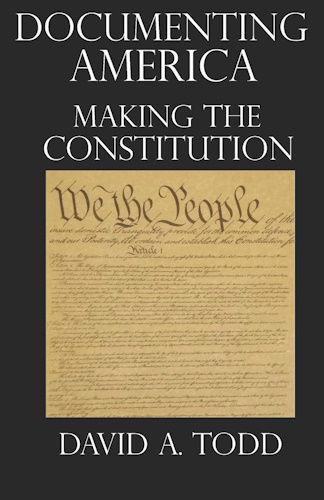


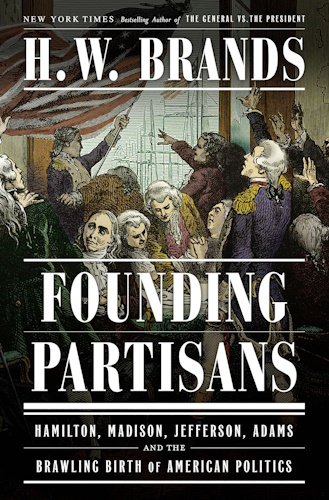
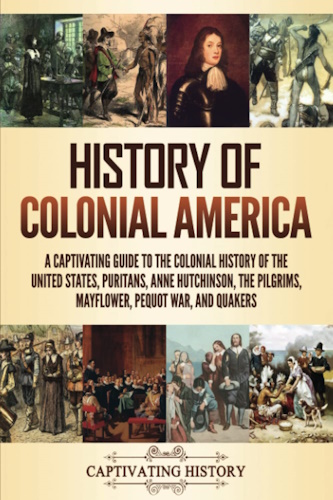
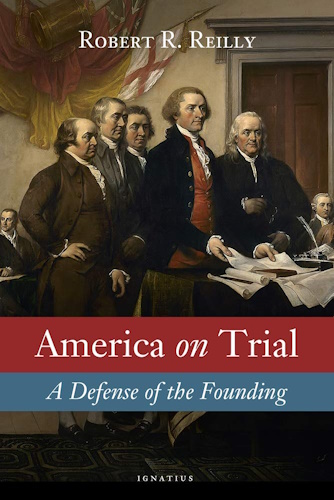
The Constitution For The United States
Its Sources and Its Application
by Thomas James Norton
(Retrieved from archive.org)
The research, work, and dedication
Of
Barefoot Bob Hardison
August 8th, 1933 - January 31st, 2009
![]()
The Constitution For The United States
Its Sources and Its Application
Contents
Preamble
Article 1
Article 2
Article 3
Article 4
Article 5
Article 6
Article 7
Ratification
First 12 Amendment Proposals
"Bill of Rights" Amend. I - X
Amend. XI -XXVII
Missing Original 13th Amendment
Letter of Transmittal
Landmark Court - Case Index
Constitution History
A Quiz for Loyal Americans
Index
"Bill of Rights"
Amendments Proposal and Discussion
ARTICLES IN ADDITION TO, AND AMENDMENT OF,
THE CONSTITUTION FOR THE UNITED STATES OF AMERICA 140
140 Of the twelve amendments proposed by Congress on September 25, 1789, the last ten amendments were Ratified pursuant to the Fifth Article of the Original Constitution by the legislatures of the several States on Dec 15, 1791, and became what is known today as "The Bill of Rights."
During the first session of the first Congress under the new Constitution this self-explanatory resolution was passed:
CONGRESS OF THE UNITED STATES
Begun and held at the City of New York, on Wednesday, the Fourth
of March, One Thousand Seven Hundred Eighty-nine.
The Conventions of a number of the States having, at the Time of their Adopting the Constitution, expressed a Desire, in Order to prevent Misconstruction or Abuse of its Powers, that further declaratory and restrictive Clauses should be added: And as exceeding the Ground of public Confidence in the Government will best insure the beneficent Ends of its Institution,
RESOLVED, by the Senate, and House of Representatives, of the United States of America, in Congress assembled, Two Thirds of both Houses concurring, That the following Articles be proposed to the Legislatures of the several States, as Amendments to the Constitution of the United States: All, or any of, which Articles, when ratified by Three-Fourths of the said Legislatures, to be valid to all Intents and Purposes, as part of the said Constitution, viz.
Articles in Addition to, and Amendment of, the Constitution of the United States of America, proposed by Congress, and ratified by the Legislatures of the several States, pursuant to the Fifth Article of the original Constitution.
The above PREAMBLE was then followed by twelve proposed amendments, the first two of which failed of adoption. The first related to membership in the House of Representatives by population, and the second was against the taking effect of laws varying the compensation of senators and representatives until an election should have intervened. This second proposed amendment was resurrected in 1985 and ratified, becoming Amendment Article XXVII after ratification on May 7, 1992. Six States had ratified this proposed amendment in the two year period from 1790 to 1791, and between 1985 and 1992 an additional 33 States ratified this amendment proposal that was nearly 200 years old.
In ALL the presentations of the Bill of Rights today this most important part of the Bill Of Rights, setting forth the purpose of the Amendments, is left off. Without this Preamble we have no protection from those who would pass amendments, laws, or otherwise corrupt the Constitution.
I have taken the liberty to emphasis in red text the area I am referring to. Please join with me to correct this misconstruction of the Bill Of Rights before it becomes an accepted presentation. It is ESSENTIAL that we read and present the Constitution in it's entirety.
This MOST IMPORTANT PART of the Bill of Rights -- the PREAMBLE which tells SPECIFICALLY that the Bill of Rights was to make sure the government knew it was limited to the powers stated in the Constitution, and if it didn't, the Amendments spell out the Rights of the People the government couldn't change. Our revisionist historians ALWAYS leave this off the Constitution!!! It is imperative that the complete text be included in any study, interpretation or construction of the contents and the Limitations of government imposed by the Constitution for the United States.
It has been stated that some scholars don't think this is important. This is a fallacy.
It is IMPERATIVE for the following reason:
The first ten amendments are "declaratory and restrictive clauses." This means they supersede and restrict all previous parts of the Constitution, and restrict all subsequent amendments to the framework of the Bill of Rights amendments. The Bill of Rights amendments are a declaration in very plain language of the restrictions to the powers of government and "STATE."
There are people in this country that do not want us to know that this Preamble ever existed. For many years these words and understanding have been "omitted" from presentations of our Constitution.
Public and private schools and colleges alike have based the education of the people and their whole interpretation of the Constitution on this fraudulent omission. (Indeed, when I was searching for it, I was informed by the Dean of the Law School at UC Berkley, that the Bill of Rights amendments had no Preamble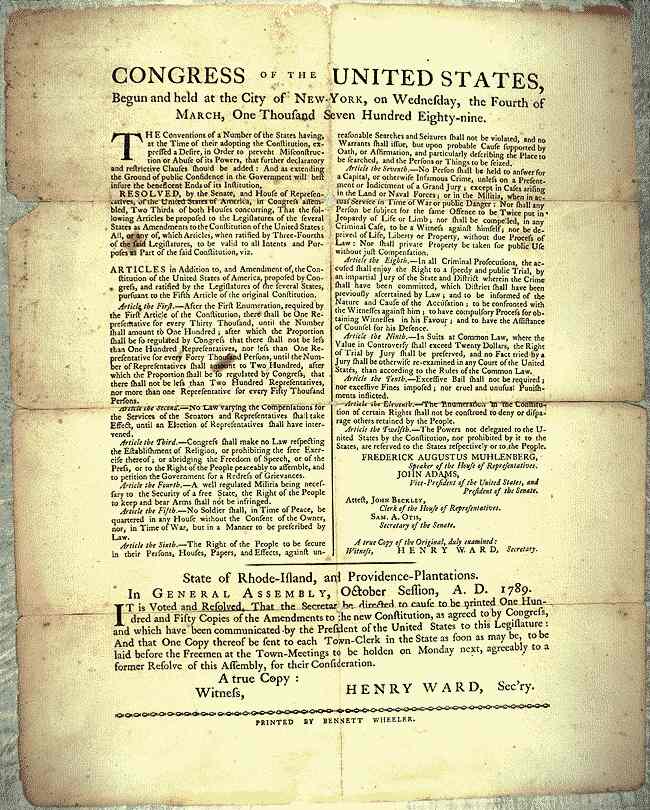 .)140
.)140
Corrupt judiciary and politicians have, through clever deception, erected interpretations and statutes that fly in the face, in direct contravention of the Bill of Rights amendments. The amendments and their declaratory and restrictive intent can be changed only by due process and the will of the people, as prescribed in the Fifth Article of the Original Constitution.
The Bill of Rights amendments, being declaratory and restrictive, are separate from all the other amendments. The Bill of Rights amendments restrict the Constitution. The Constitution restricts the powers of government and "STATE."
The deception is that government and "STATE" can interpret all of the Amendments and the Constitution itself, to serve the ends of "STATE."
By Omitting and Ignoring the Preamble to the Bill of Rights this has been done, usurping the Rights of the People.
As Thomas Cooley has said in "Principles of Constitutional Law":
"Legislators have their authority measured by the Constitution, they are chosen to do what it permits, and NOTHING MORE, and they take solemn oath to obey and support it . . . To pass an act when they are in DOUBT, whether it does or does not violate the Constitution, is to treat as of no force the most imperative obligations any person can assume."
We the People must end the deception.
The ten Amendments adopted make the so-called American Bill of Rights. The plain fact is that these Amendments do not confer any rights on anyone.
These RIGHTS are INHERENT to all FREE MEN,
bestowed on them by their CREATOR.
Amendments I through X were added to the Constitution to safeguard the intent, purpose and restriction upon government in the protection of We the People from the abuse and usurpation of Freedom by the self-serving Tyrannical Despots and Bureaucracies in government and "STATE."
It has been seen that the Petition of Right, the Declaration of Rights and the Bill of Rights were favorites of the English peoples. Following the practice in the mother country, the colonists issued a Declaration of Rights through their first Continental (Stamp Act) Congress in 1765.
More than fifteen years before the adoption of these Amendments a Declaration of Colonial Rights had been issued (1774) by the Colonies through deputies sitting "in general congress" at Philadelphia. Reciting that they were "justly alarmed by these arbitrary proceedings of Parliament," which they denounced as "unconstitutional" and "formed to enslave America," they took "into their most serious consideration the best means of attaining" their rights and concluded to "do, in the first place, as Englishmen their ancestors in like cases have usually done for asserting and vindicating their rights and liberties."
Then they made specific declarations, among them being that the foundation of liberty is the right to participate in legislative councils; that they were entitled to the "immunities and privileges" given by the colonial charters; that a standing army in the Colonies was "against law"; that restraint of "the right peaceably to assemble . . . and petition" is "illegal"; that "it is indispensably necessary to good government" that the "branches of the legislature be independent of each other" and that therefore a legislative council appointed at the pleasure of the King "is unconstitutional, dangerous and destructive to the freedom of American legislation"; and that Acts of Parliament directing that "colonists be transported to England and tried there upon accusations for treason" and other acts were "unjust and cruel, as well as unconstitutional."
The word "unconstitutional" appears in this Declaration of Colonial Rights again and again.
So Massachusetts, New York, Virginia, New Hampshire and some other States wanted a Bill of Rights in the Constitution, and with the tacit understanding that they would have one they ratified it. NH, VA Some argued that all the guaranties in the Amendments already existed in the law transplanted from England; but that was a time of written charters and written constitutions, and, to remove every possibility of doubt, a Bill of Rights was wanted in plain writing. The very fact that a writing exists between men often prevents disputes. When both know definitely what the boundaries are neither is likely to make encroachments. That our forefathers were wise in not leaving such vital matters to inference, implication, or construction will be shown by an examination of the first ten Amendments. However, their Wisdom has been largely ignored by all three branches of government, and by We the People.
"The executive in our governments is not the sole -- it is scarcely the principal -- object of my jealousy," wrote Jefferson from Paris, urging upon Madison the need of amendments making a Bill of Rights; "the tyranny of the legislatures is the most formidable dread at present, and will be for many years. That of the executive will come in its turn, but it will be at a remote period." That time has come, NOW, as We the People and the Nation enter the 21st Century.
The Constitution already contained provisions belonging to a Bill of Rights, such as those forbidding ex post facto laws 64 and bills of attainder 63, prohibiting the suspension of the privilege of habeas corpus 62, requiring trial by jury 110 and at the place where the crime was committed, defining treason and limiting punishment 113, 114, 115, 116, granting the immunities and privileges of all States to the citizens of each State 119, and forbidding a religious test 136 before admission to office.
The State constitutions which were adopted in 1776 after the Declaration of Independence contained elaborate bills of rights for the protection of the individual; and, as elsewhere observed, those constitutions were the source of much matter selected by the Constitutional Convention.
The additional safeguards which were given to all men by the so-called Bill of Rights will now be examined. They contain nothing novel. They embody "guaranties and immunities which are inherited from our English ancestors," the Supreme Court (1897) has said. Notice that it is "Safeguards" that are given, Not "Rights," and unless We The People defend those safeguards and insist in strictest adherence, We The People will deserve neither Freedom nor Rights.
It must be again noted that these amendments do not confer any rights on anyone, they were merely a written safeguard that the government and "STATE" would not infringe upon the Natural Inherent Rights of All Free Men which are bestowed upon them by their Creator.
These Safeguards Have Been INFRINGED and SUBVERTED by the "STATE."
To better understand the deceptions, infringements and subversions, every concerned citizen and serious student should thoroughly read and study "Our Enemy, The State," The Classic and Brilliant Critique Distinguishing "government" from "STATE" by Albert J. Nock, and "The Law," by Frederick Bastiat.
![]()
![]()
![]()
Disclaimer:
Some material presented will contain links, quotes, ideologies, etc., the contents of which should be understood to first, in their whole, reflect the views or opinions of their editors, and second, are used in my personal research as "fair use" sources only, and not espousement one way or the other. Researching for 'truth' leads one all over the place...a piece here, a piece there. As a researcher, I hunt, gather and disassemble resources, trying to put all the pieces into a coherent and logical whole. I encourage you to do the same. And please remember, these pages are only my effort to collect all the pieces I can find and see if they properly fit into the 'reality aggregate'.
Personal Position:
I've come to realize that 'truth' boils down to what we 'believe' the facts we've gathered point to. We only 'know' what we've 'experienced' firsthand. Everything else - what we read, what we watch, what we hear - is what someone else's gathered facts point to and 'they' 'believe' is 'truth', so that 'truth' seems to change in direct proportion to newly gathered facts divided by applied plausibility. Though I believe there is 'truth', until someone representing the celestial realm visibly appears and presents the heavenly records of Facts And Lies In The Order They Happened, I can't know for sure exactly what "the whole truth' on any given subject is, and what applies to me applies to everyone. Until then I'll continue to ask, "what does The Urantia Book say on the subject?"
~Gail Bird Allen
![]()
![]()








-
Urantia Book, 44:0.11 - The Celestial Artisans
Never in your long ascendancy will you lose the power to recognize your associates of former existences. Always, as you ascend inward in the scale of life, will you retain the ability to recognize and fraternize with the fellow beings of your previous and lower levels of experience. Each new translation or resurrection will add one more group of spirit beings to your vision range without in the least depriving you of the ability to recognize your friends and fellows of former estates.
-
Princess Bride 1987 Wallace Shawn (Vizzini) and Mandy Patinkin (Inigo Montoya)
Vizzini: HE DIDN'T FALL? INCONCEIVABLE.
Inigo Montoya: You keep using that word. I do not think it means what you think it means. -
Urantia Book, 117:4.14 - The Finite God
And here is mystery: The more closely man approaches God through love, the greater the reality -- actuality -- of that man. The more man withdraws from God, the more nearly he approaches nonreality -- cessation of existence. When man consecrates his will to the doing of the Father's will, when man gives God all that he has, then does God make that man more than he is.
-
Urantia Book, 167:7.4 - The Talk About Angels
"And do you not remember that I said to you once before that, if you had your spiritual eyes anointed, you would then see the heavens opened and behold the angels of God ascending and descending? It is by the ministry of the angels that one world may be kept in touch with other worlds, for have I not repeatedly told you that I have other sheep not of this fold?"
-
Urantia Book, Foreword - 0:12.12 - The Trinities
But we know that there dwells within the human mind a fragment of God, and that there sojourns with the human soul the Spirit of Truth; and we further know that these spirit forces conspire to enable material man to grasp the reality of spiritual values and to comprehend the philosophy of universe meanings. But even more certainly we know that these spirits of the Divine Presence are able to assist man in the spiritual appropriation of all truth contributory to the enhancement of the ever-progressing reality of personal religious experience—God-consciousness.
-
Urantia Book, 1:4.3 - The Mystery Of God
When you are through down here, when your course has been run in temporary form on earth, when your trial trip in the flesh is finished, when the dust that composes the mortal tabernacle "returns to the earth whence it came"; then, it is revealed, the indwelling "Spirit shall return to God who gave it." There sojourns within each moral being of this planet a fragment of God, a part and parcel of divinity. It is not yet yours by right of possession, but it is designedly intended to be one with you if you survive the mortal existence.
-
Urantia Book, 1:4.1 - The Mystery Of God
And the greatest of all the unfathomable mysteries of God is the phenomenon of the divine indwelling of mortal minds. The manner in which the Universal Father sojourns with the creatures of time is the most profound of all universe mysteries; the divine presence in the mind of man is the mystery of mysteries.
-
Urantia Book, 1:4.6 - The Mystery Of God
To every spirit being and to every mortal creature in every sphere and on every world of the universe of universes, the Universal Father reveals all of his gracious and divine self that can be discerned or comprehended by such spirit beings and by such mortal creatures. God is no respecter of persons, either spiritual or material. The divine presence which any child of the universe enjoys at any given moment is limited only by the capacity of such a creature to receive and to discern the spirit actualities of the supermaterial world.
-
Urantia Book, 11:0.1 - The Eternal Isle Of Paradise
Paradise is the eternal center of the universe of universes and the abiding place of the Universal Father, the Eternal Son, the Infinite Spirit, and their divine co-ordinates and associates. This central Isle is the most gigantic organized body of cosmic reality in all the master universe. Paradise is a material sphere as well as a spiritual abode. All of the intelligent creation of the Universal Father is domiciled on material abodes; hence must the absolute controlling center also be material, literal. And again it should be reiterated that spirit things and spiritual beings are real.
-
Urantia Book, 50:6.4 - Planetary Culture
Culture presupposes quality of mind; culture cannot be enhanced unless mind is elevated. Superior intellect will seek a noble culture and find some way to attain such a goal. Inferior minds will spurn the highest culture even when presented to them ready-made.
-
Urantia Book, 54:1.6 - True And False Liberty
True liberty is the associate of genuine self-respect; false liberty is the consort of self-admiration. True liberty is the fruit of self-control; false liberty, the assumption of self-assertion. Self-control leads to altruistic service; self-admiration tends towards the exploitation of others for the selfish aggrandizement of such a mistaken individual as is willing to sacrifice righteous attainment for the sake of possessing unjust power over his fellow beings.
-
Urantia Book, 54:1.9 - True And False Liberty
How dare the self-willed creature encroach upon the rights of his fellows in the name of personal liberty when the Supreme Rulers of the universe stand back in merciful respect for these prerogatives of will and potentials of personality! No being, in the exercise of his supposed personal liberty, has a right to deprive any other being of those privileges of existence conferred by the Creators and duly respected by all their loyal associates, subordinates, and subjects.
-
Urantia Book, 54:1.8 - True And False Liberty
There is no error greater than that species of self-deception which leads intelligent beings to crave the exercise of power over other beings for the purpose of depriving these persons of their natural liberties. The golden rule of human fairness cries out against all such fraud, unfairness, selfishness, and unrighteousness.

